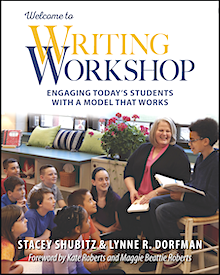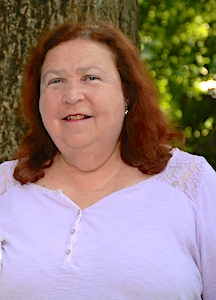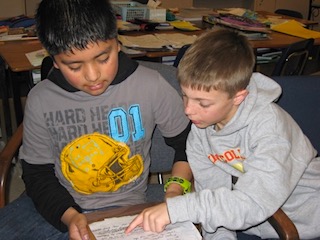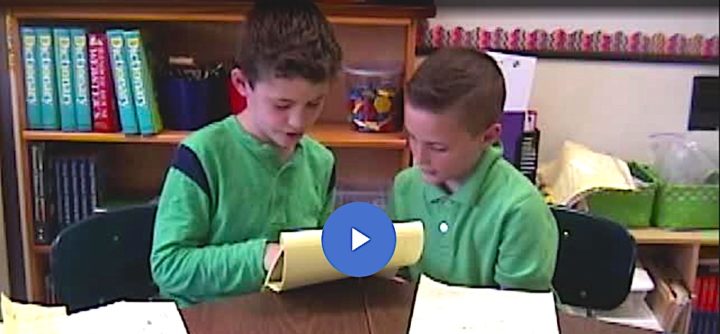Peer Conferences Keep the Writing Momentum Going
Thomas Newkirk, the author of Minds Made for Stories and many other literacy books, urges us to remember that “Students need timely and precise feedback on their writing.”
What kinds of conferences do you use in your classroom most frequently? I’ve found that writing conferences are an essential routine to effective writing instruction, but teachers often struggle to find time to confer and offer feedback to all their students on a regular schedule.
How can you make all these conferences happen? Teaching students how to hold peer conferences is the perfect solution! Everyone’s a teacher in a writing community, and you can make this good intention a reality by giving your students lots of practice with peer conferences.
Often, I model using a fishbowl technique. Students sit in a circle around two students who are naturals at conferring, or I model myself with a student or one of my colleagues. I like to use a structure like Praise-Question-Polish, an “Ear” Conference, or Read -Retell-Respond to help everyone get started. Here are some simple tips for these scaffolding techniques:
Ear Conference
✻ Read aloud the entire piece of writing or a portion. Make sure to sit side-by-side, turning one chair so it is facing away from the reader. This way students are not tempted to look at their partner’s writing. Their job is only to listen.
✻ It’s a way to hear our own work and get a sense of “flow.”
✻ Students can be encouraged to pause as they notice problems or get new ideas.
✻ A peer can choose to read a section to his student partner, pausing to allow his partner to make changes or note problem areas.
Praise/Question/Polish

✻ Look for writer’s strengths to praise. Be specific.
✻ Are you left with any questions as the reader?
✻ Offer one key suggestion to improve the piece.
Read-Retell-Respond
✻ One person reads her piece to her two partners.
✻ One person’s job is to retell what he heard. The reader may reread his piece or part of his piece to offer clarification.
✻ The third member of the triad offers a specific praise.
✻ The process is repeated until all members of the group have had a turn at each role.
Are peer conferences worth the effort?
There are many benefits to peer conferring. It will take some time, and you may feel that these conferences take a long time before they are effective, but in the end, your efforts will pay off.
Sometimes, I create brief video clips of successful conferences to share with small groups or even whole group during instructional time. Other times, I return to fishbowl again or ask the students to share their progress with peer conferring during a reflection time. Here, the entire community can learn from each other and help to problem solve.
Other ways to help students improve their peer conferring skills include:
Giving the students some language frames such as “Tell me more…”
- Generating ideas, craft, or process rather than corrections.
- Rests in the hands of the writer: each writer decides when to confer with a peer and why
to confer with a peer. He holds his own piece of writing while his partner actively listens.
Why not just stick with teacher-student conferencing?
Here are five benefits to peer conferring that students cannot gain from the student-teacher conference:
- Peers have similar life experiences (They are age alike – looking through the same lens).
- Peers do not have a teacher-student power relationship – they feel free to accept or not accept peer suggestions.
- There are more peers in the room than you – it’s about building a community of writers.
- When peers confer, they can practice the nomenclature of writers.
- Peer conferences help them believe they are writers – maintaining a writer’s identity.
In our book, A Closer Look: Learning About Our Writers with Formative Assessment, K-6, Diane Dougherty and I state, “Sharing with a partner is nonthreatening for certain, and with care and practice can provide the ‘just in time’ feedback that gives a student writer the timely nudge he needs to move forward.”
The true value of peer conferences is that writers can find an audience to share their writing and receive feedback every day. While it may possible to confer with all our students using an extended schedule, teachers cannot possibly confer with every student every day (or every week in middle school). Peer conferences help sustain the momentum of our writing instruction and can lift the level of the writing by giving students daily opportunities to be part of the revision process.
Can students really help each other?
Early in May, third graders Dan and Bryce held an unrehearsed peer conference to discuss the lead paragraphs in Bryce’s fiction piece. The video reveals some useful scaffolds the students used to help Bryce with revision.
After Bryce made some decisions based on Dan’s suggestions, the boys chorally reread the story – a technique that we had not discussed or suggested. Brenda, their classroom teacher, and I were amazed at the seamless progression of this conference. The boys clearly believed they were writers and conducted themselves in a professional, respectful manner.
In Welcome to Writing Workshop: Engaging Today’s Students with a Model That Works, Stacey Shubitz and I strongly suggest that peer conferences be used for revision work only. Initial editing should be the work of the writer in a self-conference and final editing in a student-teacher conference before a more formal publication (where work will be displayed in a public view such as hanging in the school hallway, a library, etc.).
In closing, students need more conferences than we can possibly offer them. Writers want and need an audience. Peer conferences are a safe, supportive structure that will help writers grow in their problem-solving capacity while experiencing the joy of collaborations and a spontaneous sharing of ideas.

Follow Lynne on Twitter @LynneRDorfman and on write-share-connect, the PA Writing & Literature Project’s blog.




































